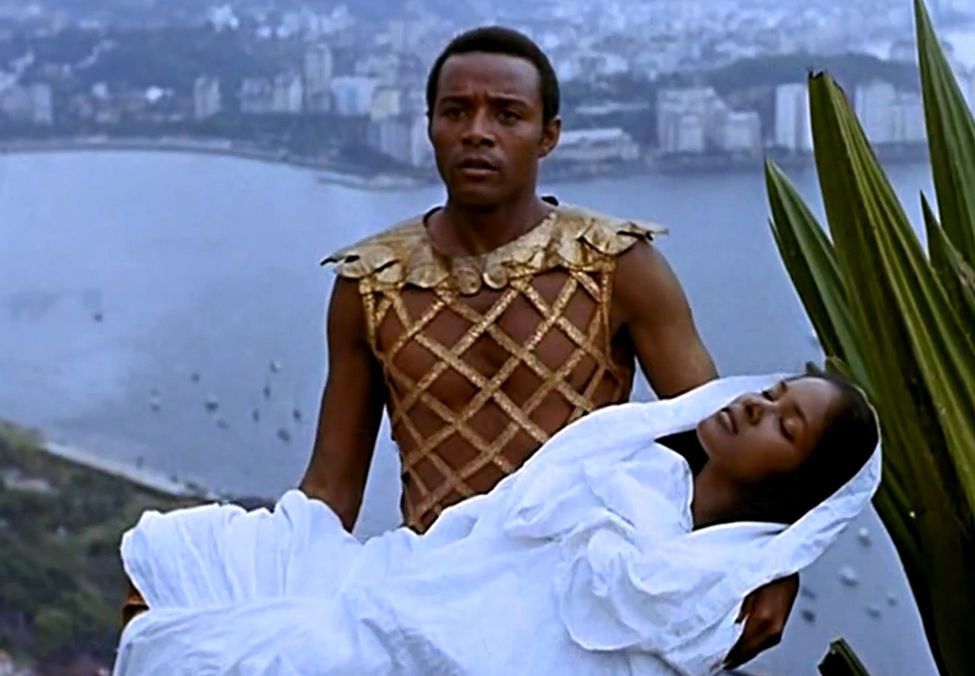|
|
Post by jamesjazzguitar on May 17, 2024 15:11:36 GMT
Of course decisions were made for business reasons. No dispute that filmmaking is a business. But there is also some bias in some decisions. Kim Novak at a TCM Festival told about Cohn's threats to Sammy Davis when she was friends with Davis. Houseman tells also about Freeman stopping shooting of a scene because there were too many people of color in the scene and they were were mingled with whites. The language used was not of business reasons. There were people in charge who were bigoted. There was also most notably Zanuck who stuck his neck out to "test the water" what the public would accept. I can't agree that all decisions were for business. And I admit that the bottom line carried a lot of weight in decisions. Of course, some industry leaders were bigots and not all decisions were based only on business, but to me your posts imply that industry leaders were more bigoted than the general public and that most decisions were centered on bigoty instead of business. So far all of your examples can be explained as business decisions when viewed from an at-the-time perspective, but when viewed from the current perspective are now labeled as bigoted. The too many people of color scene is an example of a business decisions (white audiences didn't like to see blacks mixed in with whites especially in the south), and not Freeman being a bigot, per se. Note that now silly media talking heads are saying the casting of a white actress, Luise Rainer, instead of Anna May Wong, was a bigoted decision. Rainer was cast for her box office clout and from a box office POV that was a wise business decision. Rainer won her second best actress Oscar and that helped the box office take. While I'm a big fan of Wong, she just didn't have the star power to carry what was an expensive film to make. I.e. the studio couldn't take the chance. Another example coming up now is with the John Lennon song; Woman are the "N-word" of the World. Silly media outlets are saying this is a racist song. NOT. The bottom line (for me), is that historical context needs to be viewed at-the-time it was released and not from a white-guilt POV (and BTW I'm not white). |
|
|
|
Post by kims on May 17, 2024 18:15:41 GMT
For me, the language used to express an opinion suggests emotional verses solid business decision. Just because the examples can be reconstrued to be entirely business based decisions, does not mean Freeman and Cohn were not biased. There can be excuses made for behavior of the past and one can interpret actions according to today's standards. I give more weight to the impressions of the people witnessing the events.
I'm not sure why you believed important to reveal you are non-white. Does that matter?
|
|
|
|
Post by jamesjazzguitar on May 17, 2024 19:24:33 GMT
For me, the language used to express an opinion suggests emotional verses solid business decision. Just because the examples can be reconstrued to be entirely business based decisions, does not mean Freeman and Cohn were not biased. There can be excuses made for behavior of the past and one can interpret actions according to today's standards. I give more weight to the impressions of the people witnessing the events. I'm not sure why you believed important to reveal you are non-white. Does that matter? Being white or not clearly matters to the PC activist who typical view almost everything historical as racist or bigoted. I know you're not doing this but those that wish to ban Gone with the Wind and other films, that John Lennon song and a host of others, any film that features a white actor playing a non-white character etc. are. That is what those folks' life is based on. As for people like Freeman and Cohn being biased. For me it all comes down to how one defines this. As it relates to movies, I say one is biased\racist\bigoted only if they make a decision that is bad for business due to their biases. E.g. not casting a non-white actor that had solid box-office clout (and thus a bad business decision), because they had a negative bias towards non-white actors. Another solid historical example relates to Gone With the Wind and the Oscar won by Hattie McDaniel. After she won, posters in the south would not mention her win. There were no blacks in any of the posters in the south. This wasn't done because studio suits had a bias against black actor or McDaniel but because the vast majority of white southern audiences did. Again, my overall point here is it was the white audiences that were racist and they were a lot more so than any studio suits. The studio suits just caved by catering to the racist for a buck. |
|
|
|
Post by I Love Melvin on May 18, 2024 12:40:57 GMT
I'm not going to weigh in here because I don't feel as though I have the experience or the expertise to discuss it, but I want to compliment you two for the way you've conducted the conversation like the adults you obviously are, because that doesn't always happen these days, especially around charged topics. It reflects well on yourselves and on this forum in general, so congrats.
|
|
|
|
Post by jamesjazzguitar on May 18, 2024 15:28:58 GMT
I'm not going to weigh in here because I don't feel as though I have the experience or the expertise to discuss it, but I want to compliment you two for the way you've conducted the conversation like the adults you obviously are, because that doesn't always happen these days, especially around charged topics. It reflects well on yourselves and on this forum in general, so congrats. Yea, it was nice that I was able to get off my chest and rant about issues that were only slightly connected to the original post. But the last few days when I saw that post about the Lennon song and then another about Ann May Wong and The Good Earth, I just had to voice what I viewed as revisionist history by good-hearted people that I believe are mistaken. |
|
|
|
Post by I Love Melvin on May 21, 2024 12:22:20 GMT
Coming soon:
Sylvia (1965): A poetess with a past, and it's a doozy.

|
|
|
|
Post by I Love Melvin on May 22, 2024 14:35:08 GMT
Sylvia (1965): Reading is fundamental, even for fallen women.
![]() 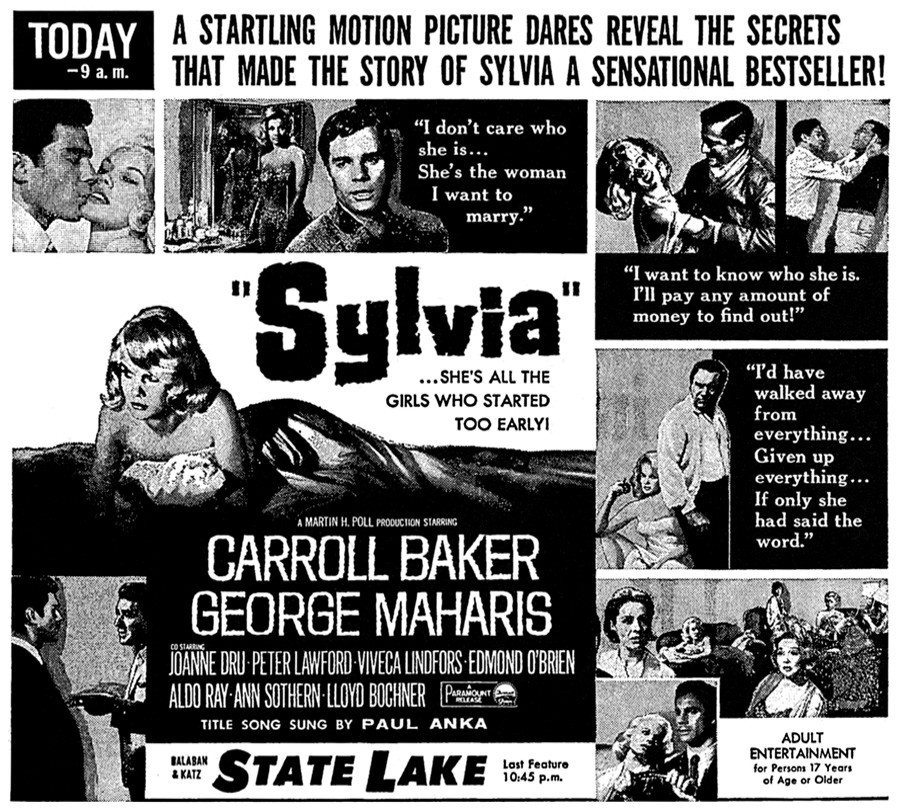
I think I've lain off Carroll Baker for a suitable amount of time, so let's look at her other epic from 1965 (the first being Harlow), Sylvia, one of those "all star"-lineup things Hollywood liked to do to lure people away from their TV's. Ironically, those same stars would be doing the exact same thing on television a decade later, if they were working at all. 1965 was right on the cusp of when Hollywood finally got up the courage to ditch the Production Code, so Sylvia is what I'd call respectably lurid, but not enough the give anyone fits, except maybe fits of the giggles. But the movie isn't a total stinker and some of the performances are quite good. Maharis' basic blandness as an actor works for a character who can't show his hand, and Baker's character can't afford to be forthcoming either, so their low-key styles pretty much work in this context. Also, be aware that there's some non-consensual sex, which seems to have gotten more of a pass in those days, sometimes with a blame-the-victim component.
It plays out as an episodic detective story, beginning with private investigator Alan "Mac" Macklin rendezvousing his sports car with a limousine on a desolate California clifftop, then being driven clandestinely to the mansion of big shot Frederick Summers (Peter Lawford). It's a promising opening for a noir, but The Big Sleep this ain't. Summers wants to do a background check on his fiance, Sylvia West (Carroll Baker), a socialite, notable poetess and a grower of prize roses, which suggests a more Hallmarky than noiry kind of gal, so let's call this Hallmark Noir, I guess? Summers: "You're good at digging up facts and, even more important, you're good at keeping your mouth shut...I want to know everything a prospective husband has a right to know...Her claimed parents never existed. An orphaned daughter never went to live with an obscure uncle...Not a word of her story checked out." Mac: "Sounds like a Thackeray or Dickens novel." We should be so lucky.
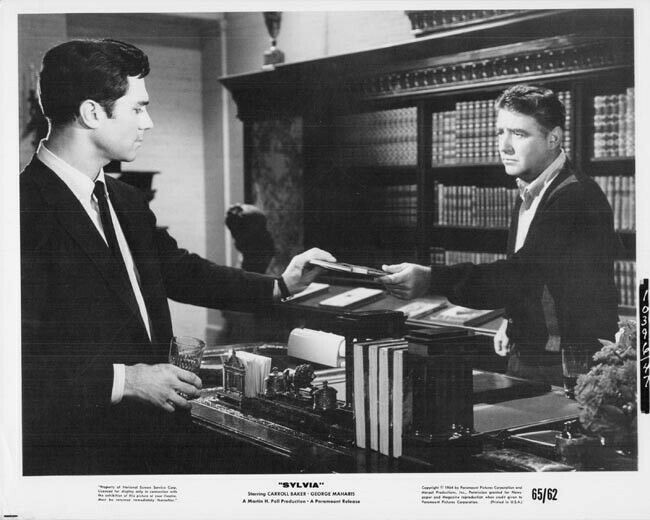
Summers doesn't want word to get back to her, so the only clue her can provide is her slim volume of poetry, Moon Without Light, which sounds like the kind of metaphorical gibberish the phrase "slim volume" often portends.
Mac's first call is on a literature professor buddy who tells him "There's no make-believe here. This writer was there in person", particularly for "the raw, the terrible and the frightening". Sylvia's story sounds icky already. In the professor's sonorous tones we hear: "Oh, preacher, I got those awful blues. I got pie in the sky and I got sin, a belly full of sin, a dark blue syncopated sin. Oh. preacher, I got those awful blues" You know...Socialite poetess problems. The prof singles out a reference to the confluence of two named rivers, which leads Mac to Pittsburg. There he makes the rounds of schoolyards, apparently without raising the kinds of red flags it would today, and questions teachers in their classrooms, with only a possible first name to go by. When he finally questions neighborhood librarian Irma Olanski (Viveca Lindfors), at the mention of the name Sylvia we see playing across her face all the subtle raptures a Method actress can conjure.

It seems that Sylvia Karocki came to her as a young scraggly-haired teenager, whom we're treated to seeing the adult Baker attempt to approximate. Keep in mind that this is nearly a decade post-Baby Doll. The yearning teen is looking for "a book about a beautiful lady", so Ms.Olanski comes up with Pride and Prejudice, though Forever Amber would probably have been a better choice to prepare poor Sylvia for what's to come.

Irma: "She read everything I gave her. We became quite close...It may sound silly, but I represented the finer things in Sylvia's life." In flashback we see a somewhat besotted Irma helping Sylvia with lipstick and makeup, maybe sending up a smoke signal about unspoken motives, but then we see her beaming those same bright eyes on Mac, so I think it's just an example of a movie wanting to hint at being naughty but unsure of how to really go about it without causing censorship problems. It's closing time, so Irma agrees to go out for a drink, then takes Mac to Sylvia's old neighborhood, prompting a flashback to Sylvia's homelife, with her abusive stepfather (Aldo Ray) cornering her in her bedroom and slamming the door against her hysterical mother.

Afterward, Sylvia emerges with a torn jumper and wanders dazed out into the street, just as a shifty itinerant storefront "preacher" is packing up his van, ready to move on and taking the lost lamb with him. This is the "syncopated blue sin" part, I guess. So it's out of the frying pan and into the fire for our Sylvia.
 
Mac finds a police report and a mugshot of the "preacher", which leads him to Mexico, where he visits a local priest (Jay Novello), who recalls a noticeably dolled-up Sylvia asking him to bury the "preacher", who'd just been killed in a knife fight on Segundo Street. "You work on that street?" asks the priest, pretty much gathering what Sylvia's been doing to support herself and the phony preacher.
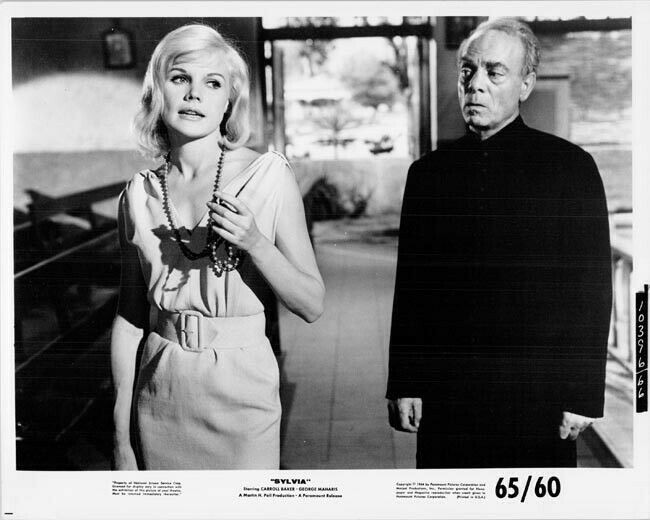
To Mac: "Does that surprise you? Don't we all sell ourselves in one way or another? I still pray for her." She'll need those prayers, because Sylvia's now got game and next we see her stepping into a station wagon, loaded with dresses identical to the one she's wearing. It's Walter Stuart (Edmond O'Brien), an American salesman of ladies' wear, and she's bargained her way into a trip back to New York, now obviously good at working the angles.
With that name as a lead, Mac tracks Walter down at his suburban home. "I was to pay all the expenses of the trip and we were to 'stay together" until New York. Nearly drove me off my rocker.", and to illustrate the point we see Sylvia naked under a sheet in a motel room reading a book.

This book-reading thing will keep coming up, telegraphing to us that she's still that yearning teenager even in the most sordid of circumstances, a further example of the moviemakers wanting to have plausible deniability as muckrakers by having it both ways. Walter: "What's wrong with my wanting our relationship to mean something?" Sylvia: 'Tell me something, Walter, do words like "our relationship" make you feel respectable?" Walter: "How about a goodnight kiss?" Sylvia: 'Skip it." Atta girl. Walter goes on to Mac: "Then she got a job in one of those arcades and I went to see her like a high school kid happy to accept crumbs." A co-worker, Mrs. Argona (Ann Sothern) calls the bouncer to have him thrown out, so Walter joins the line of men now out of the picture.
Mac tracks down Mrs. Argona, still working at the arcade. "Let's not be so formal. The other cops call me "Juicy."

For dinner, drinks and $100, she agrees to tell him the story of them becoming roommates, where Sylvia wasn't tempted by the steady stream of suckers and married men Juicy paraded through the apartment. "In all the months she was with me she was as pure as my own mother. Sylvia kept to her book-reading and then moved on....I read about her once when she got picked up by the vice cops with a couple of other girls....Did she ever make it, Mac, the gold and the diamonds?" Mac: "Almost."
That arrest record leads Mac to interview a stripper (Nancy Kovack) who was part of that roundup, jogging her memory with: "You spent thirty days in the House of Detention together", prompting her to recall that "We were all working for "Mother" then, me, Sylvia and Jane."

So it's on to Jane, who is now the respectably married Mrs. Herman Phillips (Joanne Dru).

She suspects a shake-down and tells Mac "My husband knows all about me", but agrees to talk about their days at Molly "Mother" Banter's "house", where Sylvia, true to form, once again spent her down time with her nose in a book.
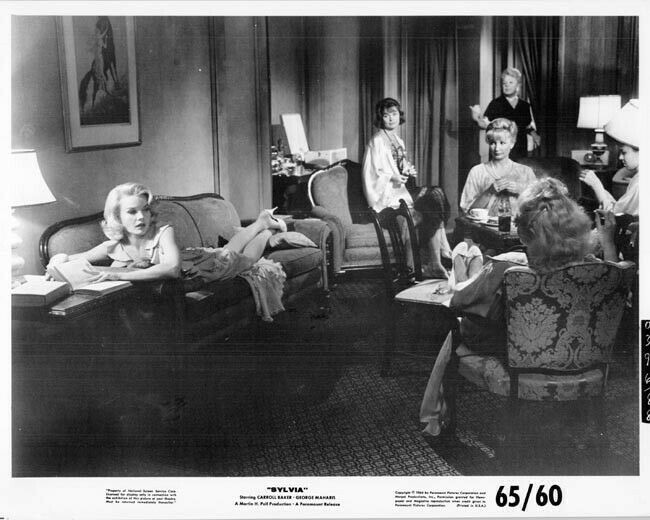
After the big raid and jail time, Jane and Sylvia decided to quit the biz and go for honest jobs, though the vice cops kept visiting their employers and getting them fired. But a freak accident put Jane in the hospital, leaving Sylvia to foot the bill by going to work for Lola Diamond (Paul Gilbert), whose nitery was a front for an escort service, using the name Sylvia Carlisle.

Cigar-smoking transvestite Lola quickly realizes Sylvia will bring class to his operation (She knows which forks to use), so, by combining her take with the powder room money she pries out of clients, she pays for a private room for Jane for 27 days. But her final customer (Lloyd Bochner) has such "special" (by which I do not mean refined) tastes that he can only point to pictures in a book he brought for the occasion. Sylvia, glancing at the book, says "It's trash.", but he counters with "You're paid for, Miss Carlisle", after which we see another door slam and hear things shatter, and a bloodied Sylvia is offered "anything you want" to not turn him in.

That money set Sylvia up for a new life, after Jane's obliging fella (now husband) invested it wisely for her. Jane: "Sylvia had to finish and start again. It had to be complete....Until I met my husband Sylvia was the only person who never betrayed or reproached me."
Back in L. A. we see Mac tailing her to see her for himself, then "meeting" her at a book store, leading to an al-fresco lunch of hot dogs, then another meeting at a flower show she's entered.

She tells him "I feel comfortable with you and don't have to be on my guard", making Sylvia the naive one for a change. She decides to tell him about herself, but he stops her, telling her he already knows. "I'm Frederick Summers boy, bought and paid for.", after which she kicks him out.
SPOILER: Mac visits Summers and tells him that he found nothing and that there is no report, but Summers says that Sylvia has already been there and told him that she'd bought the report from Mac for more money, and he vows to get Mac's license revoked, after which Mac revisits her. She tells him "I'm not sure we have any real feelings for each other than we hate each other", but a kiss quickly puts that to rest and, never having really strayed from the path of predictability, we fade out on another bad movie we love, bookworm edition.
![]()
|
|
|
|
Post by gerald424 on Jun 2, 2024 2:56:35 GMT
This is still an early stage, so I've decided to change the thread heading from the original title, Bad Movies We Love, Tolerate or Flatly Reject. Truly bad movies don't usually attract a cult following without at least being redeemed by silliness or inappropriate earnestness, since it's often the gap between intention and execution which makes them so inexplicably enjoyable. I liked kims' introduction of the idea of guilty pleasures, because pleasure really is the primary factor in our enjoyment of these movies, the exhilarating pleasure we can get in surfing a wave of cinematic misguidedness or in finding fun in what's popularly considered "lowbrow" (kims' Mr. Magoo's Christmas Carol). There's also sometimes a bit of the craven in the way some films are conceived and marketed for exploitation purposes, which gives us the opportunity to see through the charade and to turn the tables on them by having a good laugh. I suppose there's an element of guilt in our not always taking filmmakers at their word and in taking enjoyment in their misjudgment or ineptness, so Guilty Pleasures it is. Coming Soon:
Lots of teenage attitude, wayward youth on a crime spree, stolen toasters, and more, more, more I consider these "Popcorn Movies". Just fun to watch. The way I look at it, if it's entertaining, it's not a bad movie. There are all sorts of ways for a film to be entertaining. Many of the biggest movie star were no where close to any award. But, they always sold tickets.
I love the era of : Juvenile delinquency, and shocking exploitation films. Some people needed to be shocked out of their lethargy.
|
|
|
|
Post by I Love Melvin on Jul 15, 2024 18:26:20 GMT
Love Has Many Faces (1965): Fun in Acapulco, Lana-style.

"Love has many faces", warbles Nancy Wilson in the catchy title tune, "and I mean to kiss every one." You'll want to slap all those faces once this saga of the bored rich mingling with the seamier side of life gets underway, which it does immediately after the song as we witness a band of beach urchins right out of Suddenly Last Summer discover the body of a young man washed up on the shore. Cut to: beach bum and body beautiful Hugh O'Brian (wearing the Speedo he imagines will prove it) riding his waterskies skillfully to shore on the "legit" section of the beach, where he's greeted by fellow beach denizens and lifted onto their shoulders as the urchins run past looking for a cop. Next, we're aboard a yacht, with Lieutenant Andrade (Enrique Lucero) explaining to unresponsive Kit Jordan (Lana) and sardonic Pete Jordan (Cliff Robertson) that Billy, the young man, had "rented a boat and headed straight out to sea, to find the place where the sun goes down". Oh, and by the way, he was wearing a love-token bracelet engraved with "Billy...Love is thin ice" and does Mrs. Jordan perchance know anything about that? Andrade: "The beach boys call you the Summit, you and Mrs. Jordan. They come to you for help and advice", trying to plumb this nexus of relationships on the beach. But Kit remains incommunicado behind dark glasses.

The Lieutenant: "Our report will read death by drowning, possible suicide, motive unknown", leaving the enigmatic Kit with only her conscience to reckon with and it looks like that's not gonna happen. "We'll bury him" seems to be all the ground she's going to give. As Andrade leaves, Pete lifts those dark glasses off her face to confront her, but she makes no effort to smooth things over, saying "You knew what I was when you married me...and I knew you", meaning he's an ex-beach bum himself, apparently with more staying power than poor Billy.
Back on shore, studly beach god Hank (O'Brian) and his sidekick Chuck (Ron Husmann) are scoping out two new arrivals seating themselves on the hotel terrace above, American touristas Margot (Ruth Roman) and Irene (Virginia Grey). Hank: "Choice. A little over-ripe, but choice." Did he just call them over-ripe?? The women are equally interested. Margot: "My psychiatrist told me what my problem is and I just found the solution."

Enter Lieutenant Andrade, to quiz the two men about Billy and "your friends, the Jordans", with a vague threat of lifting their tourist cards. But Hank sticks to the code of the beach, saying only that "it's a good thing I'm not illegal, just immoral".

The guys then make their move on the two women, with Hank explaining "I make the beaches. I can't stay away from the..uh...water." Smooth. "My father told me to always treat a tramp like a lady and a lady like a tramp." Margot: "Have a drink and tell us more about your father. What did you say his name was? Oscar Wilde?" More than you know.
Pete heads home to the Jordan palazzo, totally financed by heiress Kit's money, with rooms the size of a hotel lobby and a drink cart always at hand. They pick up and drop one touchy subject after another, with the tensions in their marriage on full display. Kit: "You didn't always despise money so much." Pete: "I don't despise it now. Sometimes it just makes me gag." As he sits there in the same old clothes he used to wear in his beach bum days, so he's a man of principle, is I guess what we're supposed to believe.
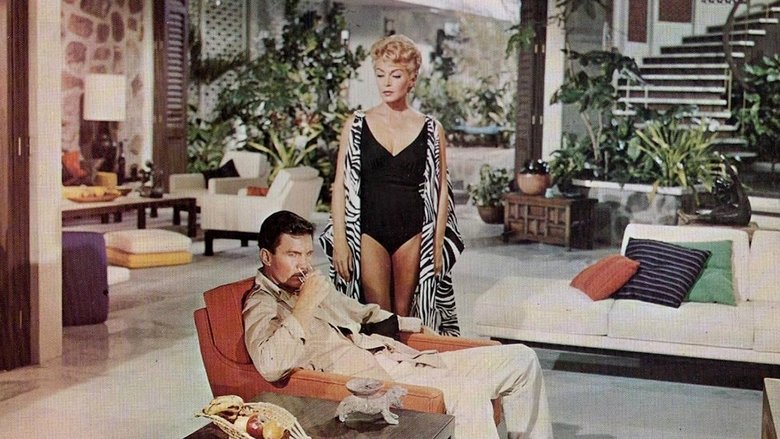
Pete: "A guy like Billy ought to have been off-limits to you. He was one of those helpless ones." Kit: "But how do you know until it's over?" And time for the big kiss-off via love bracelet? Kit, raising her glass: "Here's to us. God bless our happy home", as both turn away to nurse their drinks.
Next we find the other couples, Hank and Margot and Chuck and Irene, lazing on the beach and contemplating Kit's yacht. Hank: "He won't take his wife's money. I think it shows a great lack of character", letting Margot draw her own conclusions about his character. Bored on the yacht, Kit decides to finish her brandy on the beach, with Pete in tow. Hank uses the opportunity to drop by and spell out exactly how available he'd be if Kit ever got sick of Pete. Kit: "You might fill the days, but never the nights." Hank: "What shift did old Billy work?" Ouch. Meanwhile, we see the lieutenant squiring Billy's newly arrived girlfriend from the States, Carol (Stephanie Powers), to his gravesite, where she's come looking for answers. As per the code of the beach, answers are in short supply. She seeks out Pete as being perhaps the only reliable source of information on the beach and we, and Kit, see trouble brewing as Pete's interest in her seems to grow. Kit: "She's a Sunbonnet Sue, Pete. One of the helpless ones, the kind you don't fool with, according to you." Touche.
Later we see Kit back at home chez Jordan, philosophizing that "the good thing about brandy is that it makes you numb from here up but not from here down, because up here (tapping her head) there's nothing but trouble." You oughta know, already burying your old used-up boyfriends. To take her mind off things, she starts planning a party, the go-to move for bored socialites. Hank, always the one with an angle, invites Carol to show up at Kit's party and delivers her straight to Kit.

Carol: "I don't think Billy had a chance with you. What did you want from him?" Kit, always good at self-justification: "Less than he wanted of me." Pete later tells Carol: "Get out of here fast", but can't seem to stay away himself. Out for a drive later, Hank and Margot chance upon Pete sailing into the deserted cove where Carol has gone to think.

Hank: "You know, I must deserve my luck." Margot: "Come on...That's private....What do I like about you?" Hank: "Do you want me to tell you or to show you?" Margot: "Show me, you conniving..."
But Hank goes straight to Kit with his new information, though he missed the fact that nothing happened on the beach between Pete and Carol and Pete was actually trying to get her to leave before she got hurt. Kit: "How did you get away from your "career"? Coffee break?" Hank: "Margot? It takes her a few hours to retool herself for evening." Hank gets right to the point, manhandling Kit while he plants suspicions in her mind. Next we see Hank paying a visit to Carol: "You ought to stay. That's the good move. You know, she's scared of you." Next we see busy bee Hank, clad in a towel, taking a Polaroid of Margot, naked under a sheet on his bed. Margot: "Instant blackmail." Hank: "Blackmail? More like a present for you." Margot: "I've got a present for you too, only I don't know how much it is yet", going on to tell him she's blackmail-proof, having lost her good reputation long ago. "You could have had it all, Hank. All you had to do is wait until it was offered."

Emboldened and on a roll, Hank decides to crash Kit's gathering that night with a big rancher and a bullfighter acquaintance. Unamused, Kit introduces Hank as "the fairest flower of the beach. Any beach." But Kit's out of steam and staggers drunkenly upstairs, after which Hank dismisses everyone and follows her upstairs, only to be rebuffed again by Kit, who can't keep the hubby out of her mind.
Meanwhile, Carol has gone on a jaunt to the countryside to clear her head but has gotten sick with "the tourista" and is attended to by gentlemanly Pete, who has followed to look after her. Lo and behold, as Pete and Carol sit at an outdoor cafe up drives busybody Hank in Kit's car with Kit seated next to him, on their way to see the bullfighter and the selection of the young bulls for the arena. Carol's gotten feisty in the process of recovery and declares she'd love to go, where she and Kit have their "girl talk" confrontation, in which Carol admits an interest in Pete, and the four-way dynamic of Kit, Pete, Carol and Hank takes center stage. Kit tells Pete: "If Sunbonnet Sue has a conscience, it's hers and not yours and you can't use it." Watching the herding of the bulls, Kit is thrown from her horse and charged by one of the bulls, ending up in critical condition. So's the movie, but the end is near.
SPOILER: Outside the hospital, Carol realizes she can't compete with the invalid and splits in a taxi. Pete and Hank finally come to blows after Hank accuses Pete of only seeing Kit as a trust fund. Pete makes the decision to take the offer of an honest job on a fishing boat and visits Kit's bedside, where we see Lana in the kind of no-makeup look which probably took hours in the chair.
  
Pete: "I love you, Nina. I'm not much, but I love you", sealed with a kiss as Nancy Wilson pipes up with that chirpy title tune again, wrapping up our walk on the wild side in Acapulco. There'll be a short quiz on the code of the beach.
![]()
|
|
|
|
Post by NoShear on Jul 19, 2024 16:26:30 GMT
^ Regarding your latest two tawdry tales, I Love Melvin, I like how you drove the phony preacher's woodie out to the beach.
|
|
|
|
Post by I Love Melvin on Jul 19, 2024 23:52:33 GMT
^ Regarding your latest two tawdry tales, I Love Melvin, I like how you drove the phony preacher's woodie out to the beach. It's funny you should say that because it took me forever to find that photo of the preacher's vehicle. I finally tracked down the image, which was tucked away under the heading "1937 Ford unknown in "Sylvia, 1965". |
|
|
|
Post by NoShear on Jul 20, 2024 0:27:53 GMT
^ Regarding your latest two tawdry tales, I Love Melvin, I like how you drove the phony preacher's woodie out to the beach. It's funny you should say that because it took me forever to find that photo of the preacher's vehicle. I finally tracked down the image, which was tucked away under the heading "1937 Ford unknown in "Sylvia, 1965". For me, I Love Melvin, it was worth the search because it made for a nice segue into the subsequent review... As to the beachy yield of Love Has Many Faces, I don't think Peter O'Toole's 'awrence would find the sand too clean. |
|
|
|
Post by I Love Melvin on Jul 20, 2024 17:14:42 GMT
Coming soon: The Mole People (1956). You can believe this one because it's full of scientists.
|
|
|
|
Post by NoShear on Jul 20, 2024 17:21:54 GMT
Coming soon: The Mole People (1956). You can believe this one because it's full of scientists.
Laughing, I Love Melvin!! |
|
|
|
Post by NoShear on Jul 20, 2024 17:41:35 GMT
Of your recent The Right Stuff exchange with Fading Fast, I Love Melvin, it reminded me reading that Tom Wolfe's The Kandy*Kolored Tangerine*Flake Streamline Baby is said to have been a proposed deal with M-G-M with John Boorman as slated director but, unfortunately yielded nothing in the end...
I suppose mondo movies such as the following share some approximation with the Wolfe essays, Fading Fast and I Love Melvin:
|
|


















